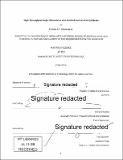| dc.contributor.author | Griswold, Kettner J. F.,
Jr. | en_US |
| dc.contributor.other | Program in Media Arts and Sciences (Massachusetts Institute of Technology) | en_US |
| dc.date.accessioned | 2024-04-10T21:40:41Z | |
| dc.date.available | 2024-04-10T21:40:41Z | |
| dc.date.copyright | 2020 | en_US |
| dc.date.issued | 2019 | en_US |
| dc.identifier.uri | https://hdl.handle.net/1721.1/154118 | |
| dc.description | Thesis: S.M., Massachusetts Institute of Technology, School of Architecture and Planning, Program in Media Arts and Sciences, 2019 | en_US |
| dc.description | Cataloged from the official PDF of thesis. | en_US |
| dc.description | Includes bibliographical references (pages 42-43). | en_US |
| dc.description.abstract | Synthetic biology is a burgeoning field with applications in medicine, agriculture, chemistry, and other fields. Synthetic biology aims to rationally engineer novel functionality into organisms, from the molecular level to whole genome scale. As an engineering discipline, synthetic biology development follows a canonical design-build-test cycle. In a typical workflow, designs are generated in computer programs, and specified at the DNA level. Subsequently, DNA encoding the design must be built to specification and tested for desired functionality in vivo or in vitro. In current practice, building DNA, by de novo DNA synthesis and related methods, is a rate limiting and costly bottleneck for researchers. State of the art de novo DNA Synthesis technologies, are trial-and-error, nondeterministic processes where turnaround times for specified DNA range on the order of weeks, and cost up to several thousand dollars per gene, multigene order. Of the many challenges inherent to building novel DNA sequences is the occurrence of truncation errors (failure to extend), and damaging side reactions during synthesis of short DNA oligonucleotide (100bp) precursors used in DNA assembly. There are also challenges in assembling oligonucleotides due to the tendency of DNA to form secondary structures and undesired annealing products during assembly reactions. Consequently, DNA synthesis companies spend upwards of 80 percent of manufacturing time sequencing thousands of DNA assemblies until a correct DNA assembly is found. This thesis describes a method for rapid, scalable, de novo DNA synthesis embodied as highly parallelized single molecule enzymatic synthesis of 10KB sequences with real time in situ sequence verification. | en_US |
| dc.description.statementofresponsibility | by Kettner J.F. Griswold Jr. | en_US |
| dc.format.extent | 43 pages | en_US |
| dc.language.iso | eng | en_US |
| dc.publisher | Massachusetts Institute of Technology | en_US |
| dc.rights | MIT theses may be protected by copyright. Please reuse MIT thesis content according to the MIT Libraries Permissions Policy, which is available through the URL provided. | en_US |
| dc.rights.uri | http://dspace.mit.edu/handle/1721.1/7582 | en_US |
| dc.subject | Program in Media Arts and Sciences | en_US |
| dc.title | High throughput single molecule in situ-verified nucleic acid synthesis | en_US |
| dc.type | Thesis | en_US |
| dc.description.degree | S.M. | en_US |
| dc.contributor.department | Program in Media Arts and Sciences (Massachusetts Institute of Technology) | en_US |
| dc.identifier.oclc | 1418760890 | en_US |
| dc.description.collection | S.M. Massachusetts Institute of Technology, School of Architecture and Planning, Program in Media Arts and Sciences | en_US |
| dspace.imported | 2024-04-10T21:40:41Z | en_US |
| mit.thesis.degree | Master | en_US |
